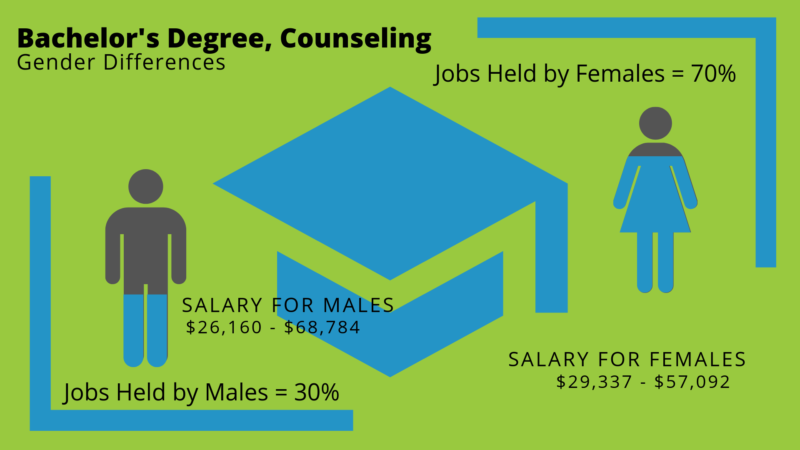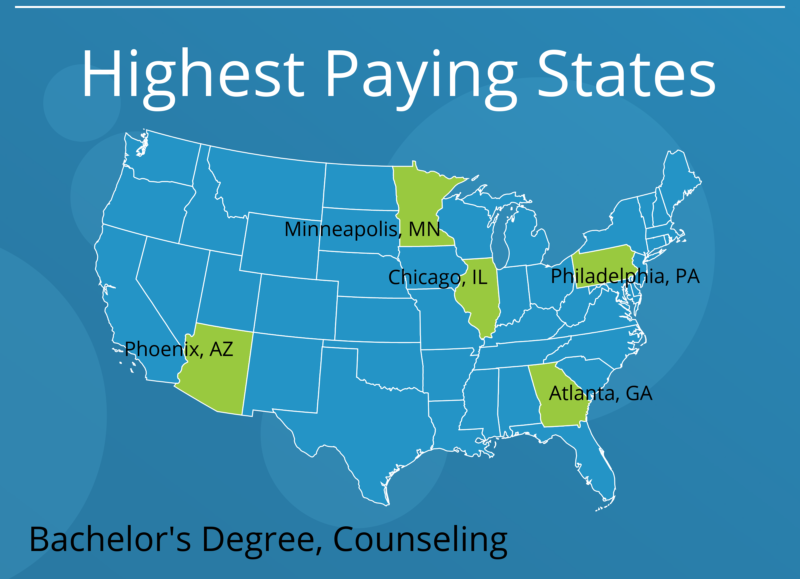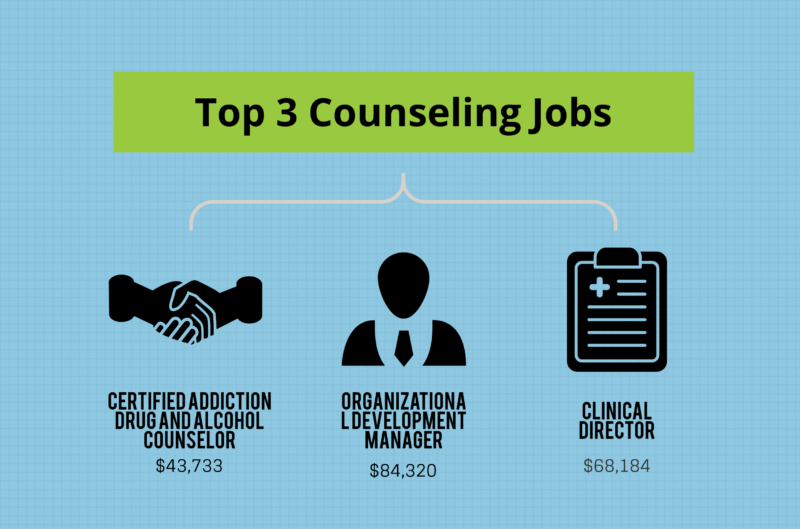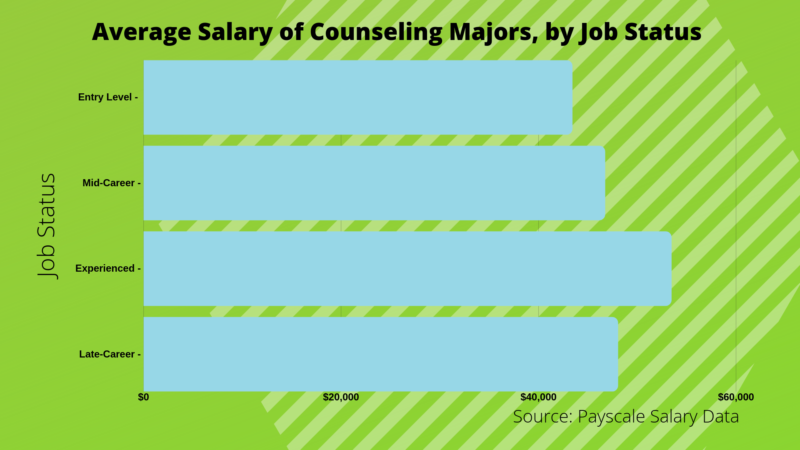According to the American Counseling Association, professional counselors provide guidance that helps others overcome life challenges. This broad statement reveals just how prolific and valuable counseling has become in modern society.
Counseling produces impressive results if the process allows for the counselor and the client to work in unison – as a team. A counselor is trained to help clients recognize their goals and to formulate viable step-by-step solutions. This includes not only identifying inner emotional mayhem, but also the provision of techniques to help a client attain a more balanced approach to life. Practical methods used include coping and communication skills that promote behavioral change.
How to Become a Counselor: Finding Your Path
Counselors impact patients’ lives in many influential ways. Professional counselors work in a variety of workplace settings because their counseling skills meet the needs of diverse age groups, occupations, backgrounds, and family situations. As you step forward and learn how to become a counselor, begin to refine your thinking and consider which counseling specialty you prefer. Ask yourself, is there a specialized patient population you’d prefer to counsel? While you need not pinpoint your exact career choice this early in the process, it is prudent to choose a broader category in which your career goals fall.
The reality is that your career objectives will ultimately determine the education and experience you will need to be properly prepared to be successful in accordance with your chosen career goals. Counseling with a bachelor’s degree is possible!
Related:
Best Online Counseling Degree Programs
Top Psychology Degree Programs
Cheapest Psychology Degree Programs
Fastest Online Psychology Degrees Programs
If you are ready to step upon the path that shows you how to become a counselor with bachelor degree, begin by searching for schools that have undergraduate counseling programs that provide the education and training you will need to be a successful counselor in the field of your choice. Coursework for those seeking to know how to become a therapist or counselor starts with basic liberal arts classes, including counseling and psychology courses. As you progress through your studies, classes become more specialized in the major of your choice.

What Can I Do with a Degree in Counseling?
When one considers the innumerable causes of stress in modern life, it is easy to see how the future of counseling job prospects can only be described as auspicious. Overall, including all the varied careers available to those who have earned their bachelor’s in counseling, the job market is anticipated to grow in line with similar occupations through 2026. These specifics are discussed in detail later.
Those who earn baccalaureate degrees in counseling have the proper training to locate jobs opportunities in the fields of education, mental health, and human development. Different counseling work settings are plentiful, as one can choose to work in a mental health agency, a hospital, a rehab facility, a business or a school.
When you have earned your bachelor’s degree in counseling, it acts as a stepping stone to more advanced, and specialized jobs available by those who wish to take the next step to earn their master’s degree.
Now you should have a head start in understanding how to become a therapist or counselor as you consider your future career plans.
How to Become a Counselor: Education
Colleges and universities that offer a Bachelor’s Degree in Counseling program are not “required” to be accredited by a government-approved accreditation agency. However, choosing an unaccredited counseling program would be unwise, as counseling program accreditation significantly contributes to the school’s status and reputation. If you have loftier career goals in the field of counseling, it is imperative that you choose a curriculum that complies with the Council for Accreditation of Counseling & Related Education Program (CACREP) standards. Meeting these standards applies to accredited school counseling programs online and on-campus.
Why is CACREP Accreditation Important?
Research shows CACREP standards ensure graduates are more likely to pass the National Counselor Examination for Licensure and Certification (NCE). Programs accredited by CACREP prescribe a curriculum that provides direct pathways that meets most state licensing requirements.
CACREP vs APA Accreditation
The American Psychological Association (APA) accreditation emphasizes the valuation of equal access to required knowledge. It encourages schools to autonomously self-define their curriculum to meet said goal. On the other hand, CACREP explicitly defines skills and proficiencies a program of study must provide which allow students to demonstrate their ability.
National v. Regional Accreditation
The Department of Education recognizes regional accreditation as the highest standard of achievement for colleges and universities. There are six primary accrediting areas within the United States. These include:
- MSA – Middle States Association
- NAC – Northwest Accreditation Commission
- NCA – North Central Association
- NEASC – New England Association
- SACS – Southern Association
- WASC – Western Association
Differing accreditations offer differing benefits. While a nationally accredited school may fare better with regards to a program’s ease of entrance or, its affordability, regionally accredited schools tend to have elevated academic reputations. It’s also important, as many counseling certifications and licensure exams require a degree from a regionally accredited institution just to apply.
Those holding a counseling degree will need to earn the appropriate state license before being legally allowed to practice the art of counseling. A license is typically obtained by applying for, and passing a comprehensive licensing exam issued by each state. Each state-licensing exam differs from the others, but again, most states require at least a degree from a regionally-accredited school
Types of Counseling Degrees
A counseling degree at the baccalaureate level offer graduates a plethora of career options. Bachelor’s in counseling graduates find that upon graduation they have the option to select from a variety of career opportunities. A counseling degree online or an online bachelor’s degree in psychology prepares you for a successful career despite the fact the program was offered as a distance-learning option.
As a therapist major with a Bachelor’s in Counseling, you will have little need to ask yourself – What degree do I need to be a counselor? Your counseling bachelor degree answers this question as a counseling major offers graduates a dynamic choice of popular career options.

Consider the following different career paths for the varying types of counseling degrees:
General Counselor – assists a large array of people with a variety of issues. Those with a therapist major focus upon identifying the cause of ongoing problems that primarily deals with substance abuse, relationship issues, work-related problems or the treatment of mental health disorders. Ultimately, the work objectives of those who hold a counseling bachelor’s degree are to collaboratively create treatment techniques to help their clients at work, in relationships, with substance abuse, or with mental health disorders. They devise treatment methods designed to help their client cope with or reverse the problems that impact their lives most negatively.
Mental Health Counselor – works with people who struggle from mental health issues that have been either appropriately diagnosed or, those issues that remain undiagnosed. Specifically, these mental health concerns include obsessive behavior, substance abuse, stress, depression, and anxiety. Mental Health Counselors also treat the many forms of addiction: gambling addiction, sex addiction, video game addiction, compulsive overeating, and even shopping addiction, among others. Counseling degree graduates work closely with the patient (and those people in the patient’s life) to create significant, effective, long-term treatment decisions. A mental health counselor works in outpatient environments as well as inpatient facilities. If you have graduated from one of the best mental health counseling programs, get ready to take advantage of the many counseling positions available.
If you have earned an online psychology counseling degree, you possess the skills and tools to work in many different mental health capacities. A bachelors of science in psychology online also prepares graduates to work with clients challenged by mental illness.
Marriage or Family Counselor – help their clients address a wide range of personal issues and psychological problems. However, those who have earned a marriage and family therapist degree focus and interpersonal dynamics between family members and/or married couples. Their goal is to restore harmony to the family unit while helping each member deal with the issues that compromise their relationships with the people closest to them.
Schools offering a marriage and family therapist degree program will likely have procedures in place for students who want to earn additional accreditation through the completion of other family counseling certificate programs.
School Counselor – works with school-age children that range from small children to young adults, specifically in some form of a school setting. They are tasked with the responsibility of facilitating and integrating each student’s personal, social and academic worlds to promote development and growth. The school-counseling field is somewhat unique, as it requires a counseling practitioner to minimize psychosocial development issues, while attempting to maximize career development.
Rehabilitation Counselor – works with people who have physical disabilities by introducing coping skills to manage the impact of emotional and physical impacts of the disability. However, a rehabilitation counselor focuses on the many logistical and psychological effects of the disability. Physical therapists are trained specialists that help with mobility issues.
It is important to note that the term “counselor” and a “therapist” are often used interchangeably because the definitions overlap quite a bit. In general terms, the training and education needed to become a counselor online is less than is required to earn a therapist degree.
For students considering a counseling degree online, know that there are many online school counseling degrees and colleges for counseling degrees. Some universities and colleges even offer free online counseling classes, however, the completion of these classes do not typically provide semester credit hours. Remember, that while your initial search might include bachelor of counseling degrees from online school counseling degrees, it is also critical to review the counseling major requirements as well as the school’s accreditation.
Types of Counseling Certifications
Obtaining a counselor certification is a smart way to enhance your professional development and career prospects. One such example of a specialized certificate is the National Certified School Counselor, a subset of the more generalized counseling industry.
Certification is the process in which a professional demonstrate their abilities, usually through offering proof of their accomplishments and passing an examination. A Certification is also the written verification that officially represents a professional’s qualifications and status. Certificates can be earned through continuing education that meets the therapist education needed. But, anyway you slice it, a certificate holder shows a professional’s commitment to the profession.
Certain types of counseling certifications are often included as a part of the therapist requirements included in a counseling degree program’s curriculum. Your initial research for potential schools is often a smart way to learn how to earn a counseling certification. A counselor certification is also a legitimate marketing tool because, given a choice, and with all else remaining equal, those seeking counseling would likely select the nationally certified counselor instead of one without. Meeting the therapist requirements delineated by a counselor certification program can provide financial benefits too!
For instance, earning a certificate from the National Board for Certified Counselors (NBCC) is likely to open doors to job opportunities that were previously unavailable. When applying for a job, an earned certification may be the tiebreaker between two equally talented job prospects. This is because holding that certification reveals a commitment and expertise in a specific area of counseling.
How to Get a Counselor Certification
When you have graduated from a bachelor’s in a counseling program that has met CACREP standards, degree holders now have an opportunity to apply to the National Board for Certified Counselors (NBCC) – the professional agency that awards the National Certified Counselor(NCC) certificate. While this certification offers a variety of professional benefits, it does not eliminate the need for you to obtain a state license. One of the benefits of this certification is that some states offer a fast track regarding the licensing procedures for National Certified Counselor certificate holders.
Once licensed, counselors have a variety of credentials and training options pertaining to specialty patient populations, treatment methodologies, and clinical environments. These advanced credentials include some, but not all available certificates:
- CCMHC – Certified Clinical Mental Health Counselor
- CFT – Certified Family Therapist
- FHE – Forensic Health Evaluators
- GCDF – Global Career Development Facilitator
- MAC – Master Addictions Counselor
As in most fields, there are various types of counseling certifications, which are not always required to secure, a well-paying counseling position will enhance your employability. However, it is important to know that the best degree for counseling is the one that meets your personal career goals. You have learned how to get a counseling certification; the next step is your actual career.

Careers in Counseling
As you ready yourself for your next career move, have you considered how to become a mental health counselor or what types of therapy careers are available? If you have asked yourself how to become a counselor without a degree, it is best to focus mostly on entry-level counseling positions.
The many types of jobs in counseling with a bachelor’s degree are available in a variety of different industries. While many counselors have a career objective to open their own private practices, still others prefer not. For those who do not wish to become a mental health counselor working in private practice, there are many industries to select from. The following is a partial list of public sector jobs a counselor can work:
- Detention Facility
- School
- University
- Hospital
- Government Agency
- Nursing Facility
- Public Or Private Clinic
- Social Services Agency
- Human services
- Social work
- Family Therapy
- Addiction counseling
- Case management
- Professional counseling
- Career counseling
- Behavioral health
- Group counseling
A mental health therapist job description for those working in the private sector would focus upon those business and organizations where people’s (customers and staff) behavior significantly impact a business’ operation.
Your work experience, undergraduate degree, specialization, and many other factors impact your career opportunities. A doctoral degree or other graduate degree offers more than a bachelor of arts or science. If you want to become a substance abuse counselor or licensed counselor, online programs are readily available. Social workers are in a related field that is also in high demand.
The Outlook for Different Types of Therapy Careers
The Bureau of Labor Statistics (BLS) is a federal agency that projects future job market conditions based on a statistical analysis that uses volumes and volumes of federal government data. Because of the many and varied specialties within the counseling profession, the BLS has specific statistical results for each individual specialty. Within these detailed pages disclosed by the Bureau of Labor Statistics, you find out how to become a family counselor, and learn of abnormal psychology jobs as well as non-licensed counseling jobs.
Learning how to become a mental health counselor is the first step to reaching for your career objectives. The next step is to decide among the many types of therapy careers available. For those who want to learn how to become a counselor without a degree, you might want to re-consider that an online counseling degree path will propel you to loftier objectives. For instance, consider that a Recreation Counselor, which requires only a high school diploma to be employed, has a therapist salary per hour of $11.80. Counseling jobs with a bachelor’s degree may pay less than a higher degree, however.
The U.S. Bureau of Labor Statistics predicts that the future demand for all counselors remains strong, however, differences exist among the specialties and certain areas that do not match national averages.
The following details the anticipated job growth of a variety of counseling specialties – through the year 2026. The percentages noted for each counseling area denotes the government’s expected industry growth.
- Marriage & Family Counselors– 20% (much faster than average of all careers)
- Mental Health Counselors- 20% (much faster than average of all careers)
- Substance Abuse/Behavioral Disorder Counselors- 20% (much faster than average of all careers)
- School & Career Counselors- 11% (in line with the average of all careers)
- Rehabilitation Counselors– 10% (in line with the average of all careers)
As is obvious, the BLS expects job growth in counseling and therapy to not only be steady, but in many cases extremely prolific. Choosing counseling is clearly a career path that will offer job opportunity. But is there money to be made?
How Much Money Does a Therapist Make? Salary Expectations
Let’s begin with the burning question: How much money does a therapist make?
When considering the counseling specialty you are interested in, the first questions you will ask yourself many financial and salary questions. These inquiries take the form of: How much do therapists make an hour? How much do therapists make an hour? How do they compare to a private practice clinical therapist salary?
As noted below, a therapist salary falls within a large range of potential salaries. Clearly, a psychological therapist salary per year will differ from a general therapist salary per year or a private practice clinical therapist salary. How much do marriage counselors make an hour? School counselors?
According to BLS, here are the latest therapist salary statistics:
School Counselor Salary & Outlook – The 2017 median pay for school and career counselors is $26.64/ hour. The anticipated job growth (over the next decade) of 13% is considered faster than average. A psychological therapist salary is considered to be on the upper range of a therapist salary.
Family Therapist Salary & Outlook – How much do marriage counselors make an hour? The 2017 licensed marriage or family therapist salary per hour is $23.45. The anticipated job growth of 23% (over the next decade), is considered much faster than average.
Mental Therapist Salary & Outlook – The 2017 mental therapist salary (which includes substance abuse, and behavioral disorder counselors) is $20.82. This should answer the question as to how much do mental health therapists make per hour. The anticipated job growth for a mental therapist of 23% (over the next decade) is considered much faster than average.
Rehabilitation Counselor Salary & Outlook – The 2017 rehabilitation certified counselor salary is $16.76/ hour. The anticipated job growth (over the next decade), of 13% is considered faster than average.
The potential for a mental health salary or a family therapist salary(or any other counseling position) is contingent upon the degree earned, professional experience, and the attainment of one or more certification levels. Overall, and in accordance with the Bureau of Labor Statistics, counselors working for state or local government agencies typically receive the most lucrative offers. The next highest therapist salary is for those working in hospitals and then, those working for residential care facilities. A private practice clinical therapist salary or a psychological therapist salary both reach greater annual earnings.
Job prospects and salary are dependent on the counseling type, as well as degree and certification level. Typically, counselors who work at local or state government agencies are paid the highest counselor salary, according to the Bureau of Labor Statistics (BLS), followed by hospitals and then residential care facilities. Counselors who have established private practices, as well as counselors employed in a group practice, had the highest counseling psychology salary of all other industries that employed a counselor’s services.

Professional Counselor Organizations
Professional Organizations and counselor organizations possess great value for those in the field or specialty they oversee and manage. Professional organizations are a smart way to stay on top of current issues, or for those who are looking for employment opportunities. Joining a professional organization is also a great way to give back to other professionals working in the same capacity. These professional affiliations can be national organizations like the American Psychological Association. However, there are specialty organizations like American Mental Health Counselors Association(AMHCA) who has defined and now enforces the AMHCA Code of Ethics.
The following list of professional organizations offers great insight into how valuable your membership may be in terms of education, licensing options and, steps towards career advancement.
American Association for Marriage and Family Therapists (AAMFT)
American Counseling Association Membership (ACA)
American Mental Health Counselors Association (AMHCA)
American Psychological Association (APA)
American School Counselor Association (ASCA)
International Association of Marriage and Family Counselors (IAMFC)
National Board for Certified Counselors (NBCC)
National Career Development Association (NCDA)
There are counselor organizations that target specific kinds of counseling practices. Many counselors follow the AMHCA Code of Ethics or join a national professional organization, like the American Counseling Association. Simultaneously, counselors find it beneficial by joining smaller professional organizations as follows:
American College Counseling Association (ACCA)
American Mental Health Counselors Association (AMHCA)
American Rehabilitation Counseling Association (ARCA)
American School Counselor Association (ASCA)
Association for Adult Development and Aging (AADA)
Association for Assessment in Counseling and Education (AAC)International Association of Addiction and Offender Counselors (IAAOC)
Association for Counselor Education and Supervision (ACES)
Association for Counselors and Educators in Government (ACEG)
Association for Creativity in Counseling (ACC)
Association for Lesbian, Gay, Bisexual, & Transgender Issues in Counseling (ALGBTIC)
Association for Multicultural Counseling and Development (AMCD)
Association for Specialists in Group Work (ASGW)
Association for Spiritual, Ethical, and Religious Values in Counseling (ASERVIC)
Association of Guidance Counselors
Counseling Association for Humanistic Education and Development (C‑AHEAD)
Counselors for Social Justice
International Association of Marriage and Family Counselors (IAMFC)
National Career Development Association (NCDA)
National Employment Counseling Association (NECA)
School Psychologist Association
The Association for Humanistic Counseling (AHC)
